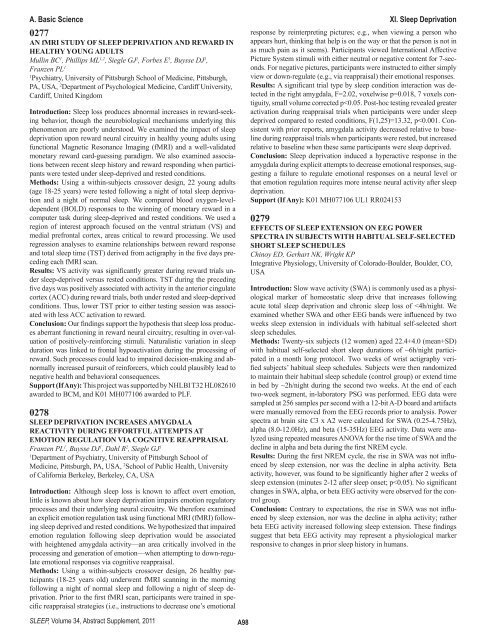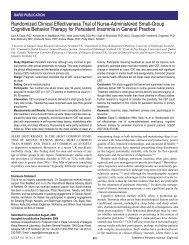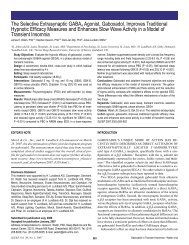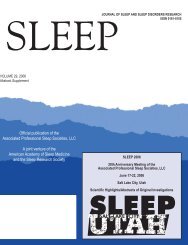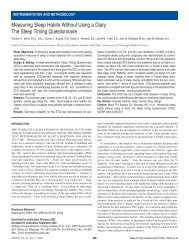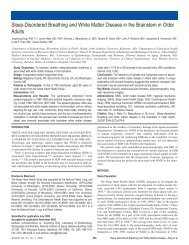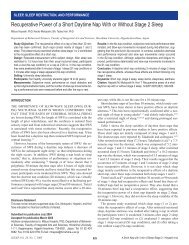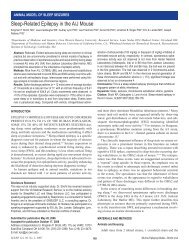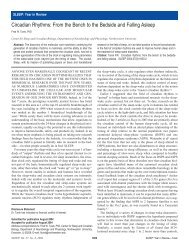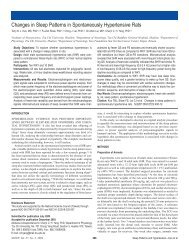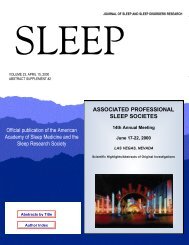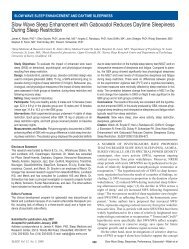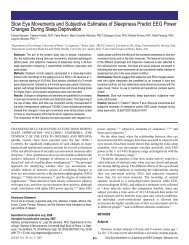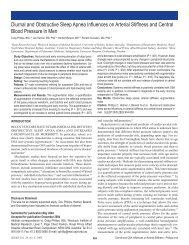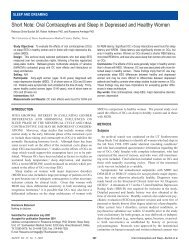SLEEP 2011 Abstract Supplement
SLEEP 2011 Abstract Supplement
SLEEP 2011 Abstract Supplement
You also want an ePaper? Increase the reach of your titles
YUMPU automatically turns print PDFs into web optimized ePapers that Google loves.
A. Basic Science XI. Sleep Deprivation<br />
0277<br />
AN fMRI STUDY OF <strong>SLEEP</strong> DEPRIVATION AND REWARD IN<br />
HEALTHY YOUNG ADULTS<br />
Mullin BC 1 , Phillips ML 1,2 , Siegle GJ 1 , Forbes E 1 , Buysse DJ 1 ,<br />
Franzen PL 1<br />
1<br />
Psychiatry, University of Pittsburgh School of Medicine, Pittsburgh,<br />
PA, USA, 2 Department of Psychological Medicine, Cardiff University,<br />
Cardiff, United Kingdom<br />
Introduction: Sleep loss produces abnormal increases in reward-seeking<br />
behavior, though the neurobiological mechanisms underlying this<br />
phenomenon are poorly understood. We examined the impact of sleep<br />
deprivation upon reward neural circuitry in healthy young adults using<br />
functional Magnetic Resonance Imaging (fMRI) and a well-validated<br />
monetary reward card-guessing paradigm. We also examined associations<br />
between recent sleep history and reward responding when participants<br />
were tested under sleep-deprived and rested conditions.<br />
Methods: Using a within-subjects crossover design, 22 young adults<br />
(age 18-25 years) were tested following a night of total sleep deprivation<br />
and a night of normal sleep. We compared blood oxygen-leveldependent<br />
(BOLD) responses to the winning of monetary reward in a<br />
computer task during sleep-deprived and rested conditions. We used a<br />
region of interest approach focused on the ventral striatum (VS) and<br />
medial prefrontal cortex, areas critical to reward processing. We used<br />
regression analyses to examine relationships between reward response<br />
and total sleep time (TST) derived from actigraphy in the five days preceding<br />
each fMRI scan.<br />
Results: VS activity was significantly greater during reward trials under<br />
sleep-deprived versus rested conditions. TST during the preceding<br />
five days was positively associated with activity in the anterior cingulate<br />
cortex (ACC) during reward trials, both under rested and sleep-deprived<br />
conditions. Thus, lower TST prior to either testing session was associated<br />
with less ACC activation to reward.<br />
Conclusion: Our findings support the hypothesis that sleep loss produces<br />
aberrant functioning in reward neural circuitry, resulting in over-valuation<br />
of positively-reinforcing stimuli. Naturalistic variation in sleep<br />
duration was linked to frontal hypoactivation during the processing of<br />
reward. Such processes could lead to impaired decision-making and abnormally<br />
increased pursuit of reinforcers, which could plausibly lead to<br />
negative health and behavioral consequences.<br />
Support (If Any): This project was supported by NHLBI T32 HL082610<br />
awarded to BCM, and K01 MH077106 awarded to PLF.<br />
0278<br />
<strong>SLEEP</strong> DEPRIVATION INCREASES AMYGDALA<br />
REACTIVITY DURING EFFORTFUL ATTEMPTS AT<br />
EMOTION REGULATION VIA COGNITIVE REAPPRAISAL<br />
Franzen PL 1 , Buysse DJ 1 , Dahl R 2 , Siegle GJ 1<br />
1<br />
Department of Psychiatry, University of Pittsburgh School of<br />
Medicine, Pittsburgh, PA, USA, 2 School of Public Health, University<br />
of California Berkeley, Berkeley, CA, USA<br />
Introduction: Although sleep loss is known to affect overt emotion,<br />
little is known about how sleep deprivation impairs emotion regulatory<br />
processes and their underlying neural circuitry. We therefore examined<br />
an explicit emotion regulation task using functional MRI (fMRI) following<br />
sleep deprived and rested conditions. We hypothesized that impaired<br />
emotion regulation following sleep deprivation would be associated<br />
with heightened amygdala activity—an area critically involved in the<br />
processing and generation of emotion—when attempting to down-regulate<br />
emotional responses via cognitive reappraisal.<br />
Methods: Using a within-subjects crossover design, 26 healthy participants<br />
(18-25 years old) underwent fMRI scanning in the morning<br />
following a night of normal sleep and following a night of sleep deprivation.<br />
Prior to the first fMRI scan, participants were trained in specific<br />
reappraisal strategies (i.e., instructions to decrease one’s emotional<br />
response by reinterpreting pictures; e.g., when viewing a person who<br />
appears hurt, thinking that help is on the way or that the person is not in<br />
as much pain as it seems). Participants viewed International Affective<br />
Picture System stimuli with either neutral or negative content for 7-seconds.<br />
For negative pictures, participants were instructed to either simply<br />
view or down-regulate (e.g., via reappraisal) their emotional responses.<br />
Results: A significant trial type by sleep condition interaction was detected<br />
in the right amygdala, F=2.02, voxelwise p=0.018, 7 voxels contiguity,<br />
small volume corrected p


